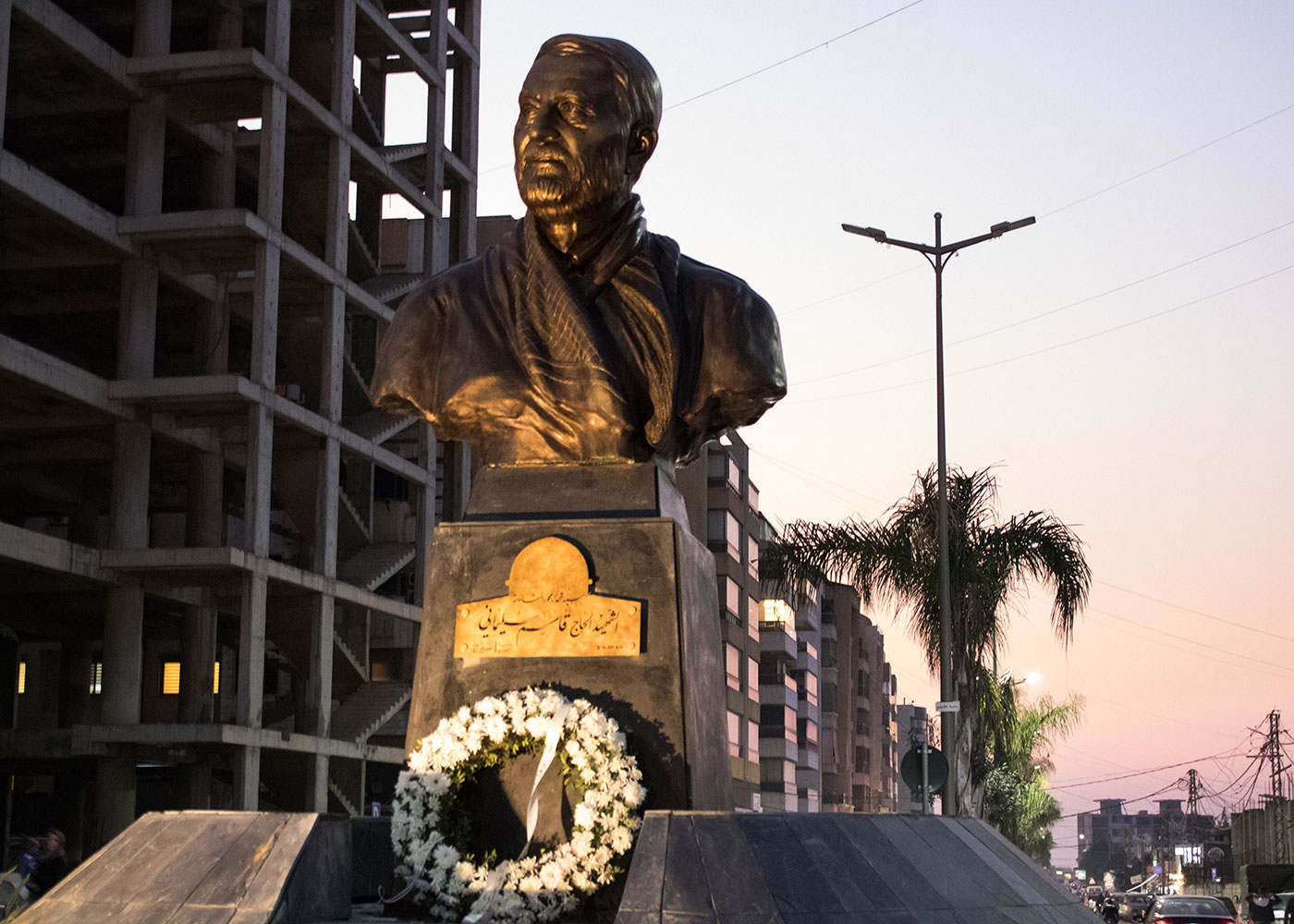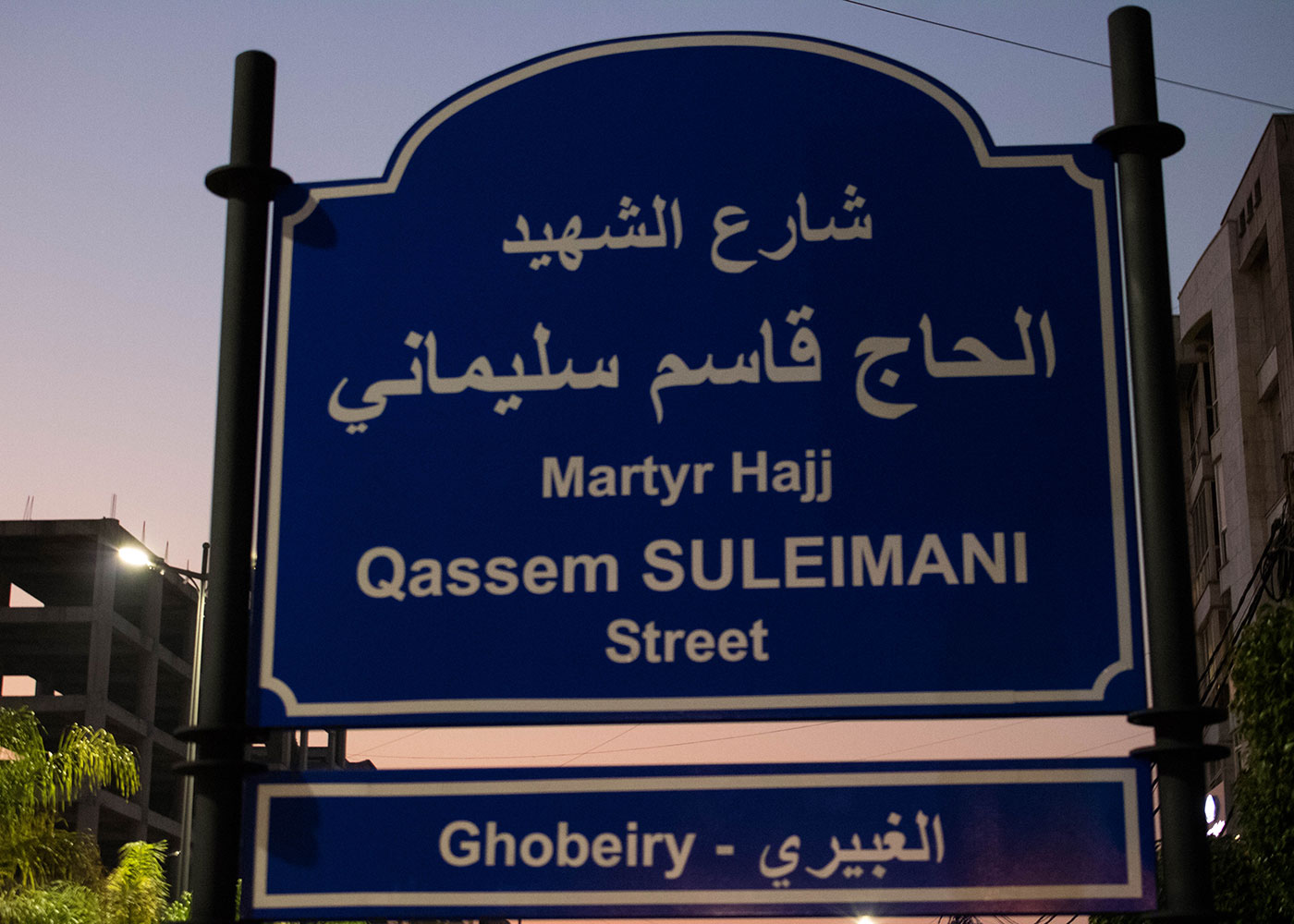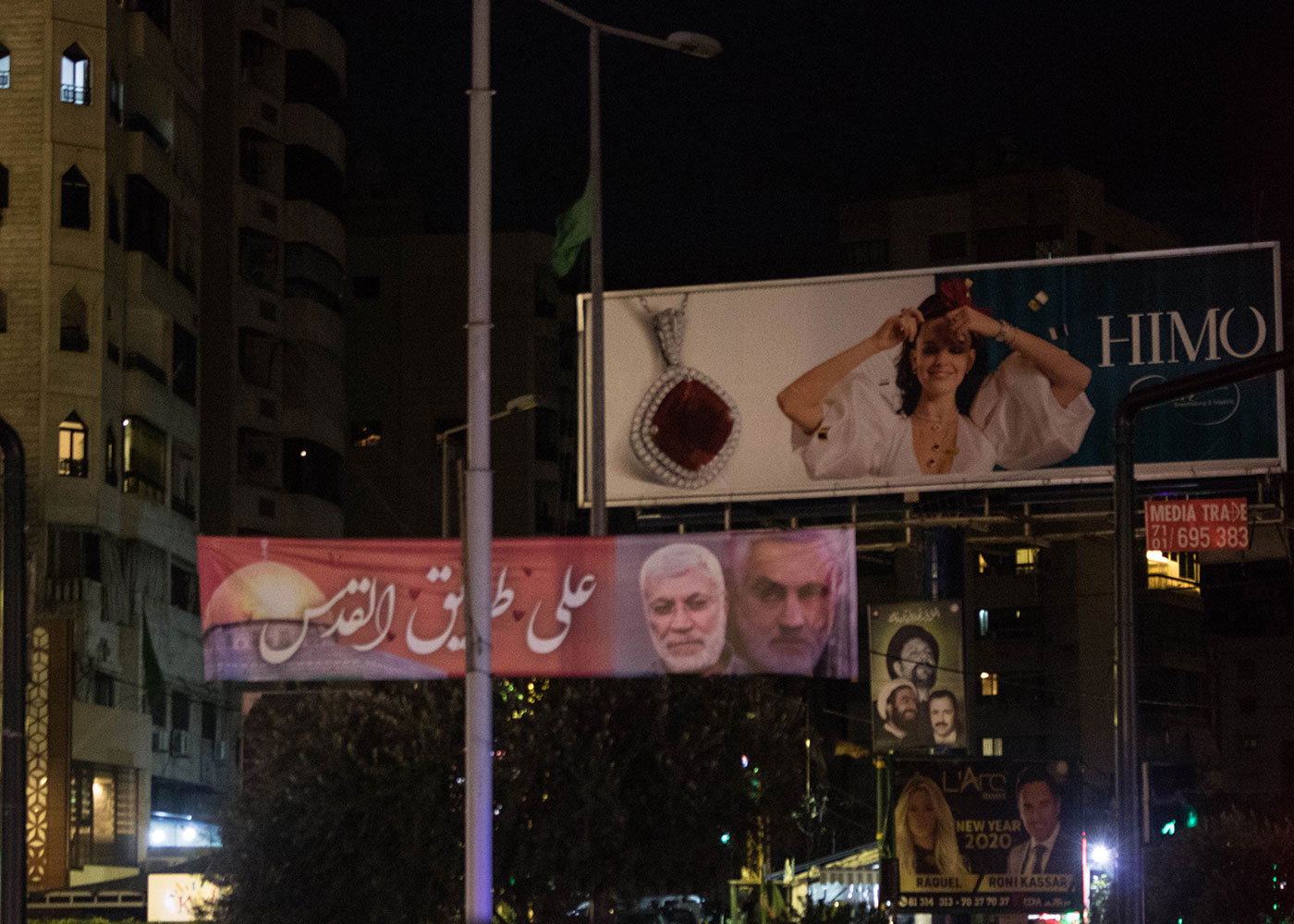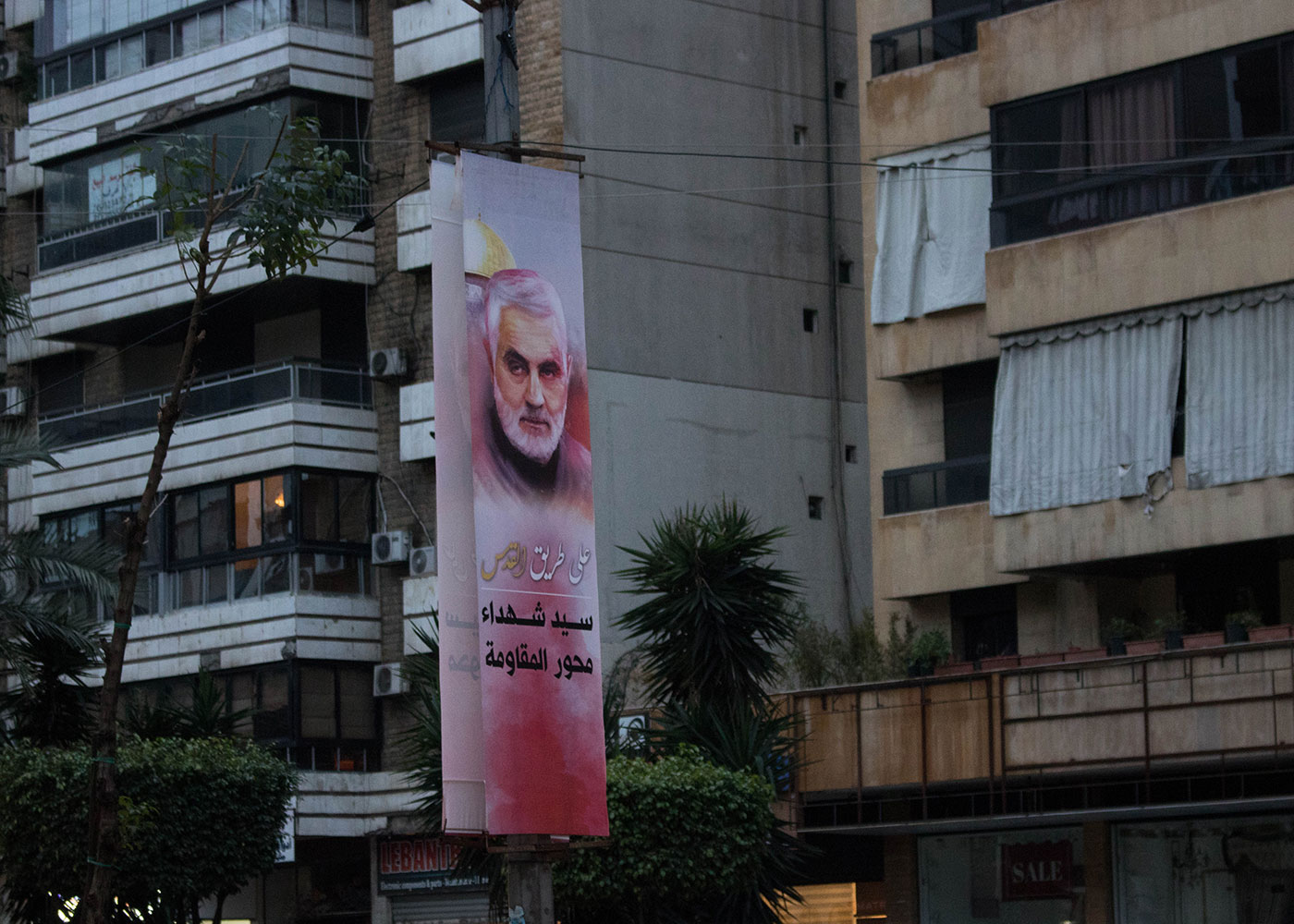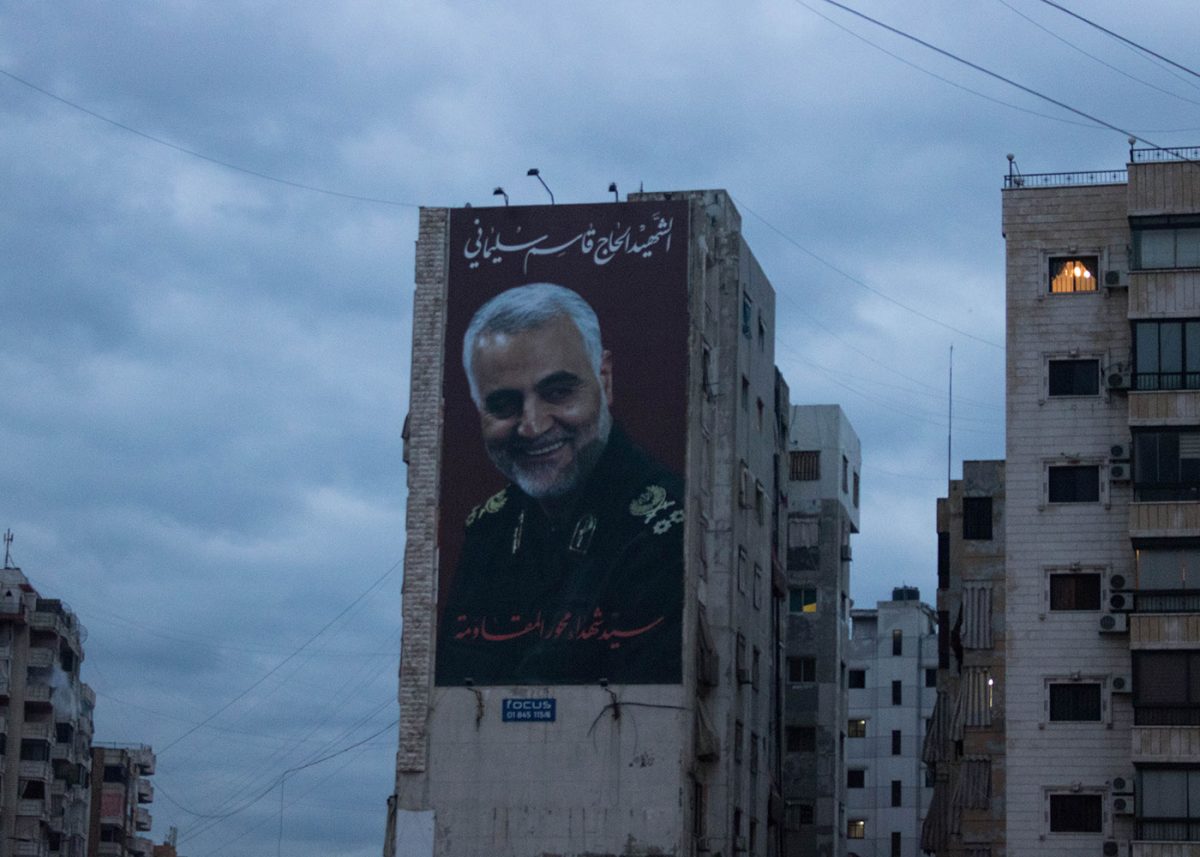
Domestic pressure and collapsing economy may put Iran's regional influence at risk, analysts say.
Billboard after billboard depicting the slain Iranian Revolutionary Guard Commander Qassem Soleimani filled the Imam Khomeini Road in the neighborhood of Ghobeiry in Beirut’s southern suburbs.
The road leading to Lebanon’s airport has been no stranger to hosting pictures of Hezbollah fighters who were martyred for the group. However, since his death, Soleimani has become the most abundant image throughout the crowded streets as posters of all sizes bearing his likeness hang above the passing cars, pedestrians and shops.
Then, on the street renamed after the commander following his killing in January 2020, the sound of music and celebration filled the air as a new statue of Soleimani was unveiled on the one year anniversary of his death.
This was only one of the statues to appear in Lebanon for the anniversary.
In the village of Arabsalim in south Lebanon, a recreation of the moment a drone missile struck Soleimani’s vehicle outside of Baghdad airport was also erected earlier in the month.
In February 2020, another statue was put up in the Maroun el-Ras border region between Lebanon and Israel and depicted Soleimani pointing towards Jerusalem with a Palestinian flag, a reminder of the Iranian and Hezbollah calls to liberate the city from Israel.
In Iraq, a massive gathering was held in the capital Baghdad to commemorate the anniversary of Soleimani’s death.
Several analysts who work on Iranian domestic and foreign policy say that, in this particular case, the push for a Soleimani cult is part of a bigger picture meant to raise Iran’s status to an equal negotiation partner to the United States, at a time when Washington is set to change presidents and foreign policy directions.
However, this decades-long policy of funding Shiite Islamist armed groups across the Middle East may raise domestic problems for Iran, as a large part of the population continue to be unhappy with the government spending hundreds of millions on Shiite militias in Iraq, Lebanon, Syria and Yemen, while the domestic economic crisis makes it difficult for many to put food on the table.
A necessary hero
For Iran and its allies, attempts to give Soleimani this legendary status began almost immediately after his death. In a speech the day after the fatal drone strike, Hezbollah’s Secretary-General Hassan Nasrallah compared the slain commander’s death to that of major religious figures in the Shia community like Imam Hussein, directly linking this loss to the Shiite sect.
“I know that Soleimani desired martyrdom,” Nasrallah stated fiercely. “But, maybe, what happened to him exceeded his expectation. He ended up headless, like Imam Hussein, and without arms, like Abbas, and his body was completely torn to pieces like Ali Akbar.”
Martyrizing Soleimani is not something new or unique for Iran, according to Mohannad Haj Ali, the director of communications for the Carnegie Middle East Center.
“Any country or non-state actor, they would build upon the legend and importance of that individual as a leverage to gain more popularity and this is exactly what they’ve done,” Haj Ali told NOW.
“[They] portrayed themselves as victims, trying to showcase the importance of Soleimani and how such a senior leader in the Islamic Republic [of Iran] is seen as someone of great importance and a super threat to a superpower such as the United States.”
He argues that Iran used religious imagery as it not only hits at the heart of the Shia faith, but also allows for them to portray themselves as a serious threat to the US and other powers, and claim that their leaders are dying for the Iranian cause.
“The analogy of the martyrs and Imam Hussein is also notable of someone who was killed by the US, assassinated,” he said. “This event, given the magnitude, has really helped them in pushing forward the narrative that the Islamic Republic is a [real] threat to the US and the leaders are sacrificing themselves on the frontline.”
Azadeh Pourzand, the 36-year-old founder of freedom of speech focused Siamak Pourzand Foundation, whose family had to leave Iran when she was a child for political reasons, noted that the use of martyrdom is indeed reminiscent of her childhood in Tehran: every street was named after someone who had died and been deemed a martyr by the regime in an effort to promote its populist agenda.
“But you have to continue to acknowledge and endorse these kinds of individuals and their families in the long-term in order to be able to maintain this kind of populist approach,” she told NOW.
Pourzand explains that families of martyrs feel that the Iranian regime is not fulfilling its commitments to them, rather using their relatives’ deaths as political propaganda tools.
This has added fuel to the growing discontent in Iran, as more and more Iranians struggle to get by amid the country’s worsening economic situation, putting the regime under scrutiny as they continue to fund armed groups in the region.
“The Iranian people are suffering and they are more aware than ever about the costs of these sorts of interventions in the region and what costs and consequences that they [hold] for them,” Pourzand explained. “The average Iranian family that cannot even afford to put food on the table is going to wonder why the resources are going to Syria, to Lebanon, to Iraq.”
A foreign policy without domestic support
Director of the Middle East Institute Iran program Alex Vatanka says that domestic pressure could force Iran to reevaluate its foreign policy so that they can better address the issues at home.
“Throughout the 1980s and 1990s, Iran could be anti-Israel and it didn’t really matter that much. They could still export their oil and they still had access to the banking system. That’s not the case anymore,” Vatanka told NOW.
“[Today] you have this thing where our foreign policy is costing us. We can literally measure the billions of dollars that we’re losing every month. What are we getting out of it?”
Vatanka argues that the Iranian government has to ask themselves if they want to stay in power comfortably, or take a risk and continue with their efforts at spreading Imam Khomeini’s revolution throughout the region at the potential cost of seeing a nationwide uprising caused by a lack of attention to serious domestic issues.
If the Iranian regime continues to fail to address the people’s struggles domestically, then, while they might be able to continue to export their ideology to Shiite groups sympathetic to Iran groups that view the US and Israel as the biggest threats, they run the serious possibility that there will be mass protests in Iran. It may force the regime to crack down harder and harder on dissent in the hopes of quelling the discontent through fear rather than putting forward real solutions, Vatanka says. With the economic restrictions that Iran currently faces, they cannot both address local issues and continue expanding their regional network of armed groups.
All about the nuclear deal
On January 4, Iran announced that it had resumed enriching its uranium stockpiles to 20 percent in a move that the Iranian government said was retaliation for the crippling sanctions that were put in place by former US President Donald Trump.
Both Vatanka and Haj Ali say that the move was yet another bargaining tactic in anticipation of a possible change of heart in Washington and renewed negotiations on Iran’s nuclear file. Former US president Donald Trump pulled out in May 2018 of the deal signed by the Obama Administration in 2015.
But the leaders in Tehran want Washington to take the first step towards negotiations and, in order to restart the talks, Iran will seek for the US to lift at least some of the sanctions.
“Nobody wants to see a nuclear-armed Iran and that’s what they are pushing for.”
Iran’s Supreme Leader Ayatollah Ali Khamenei has demanded on several occasions that the US lift its sanctions on Tehran.
During a speech just days after celebrations commemorating the one year anniversary of the death of Soleimani, Khamenei said that “we are in no rush and we are not insisting on their [the US] return [to the negotiating table].
Our demand, which is both logical and rational, is the lifting of sanctions.”
Haj Ali also argues that beginning to enrich uranium once again Iran places the nuclear file at the forefront of negotiations, calling attention away from the country’s regional influence and actions.
“With the uranium enrichment back to what it was, they have the same bargaining chips and they can sit down at the table and do a swap without touching upon their regional influence and their regional role like the Trump administration hoped,” he said.
However, while Iran continues to maintain a major role in countries like Iraq, Yemen, Syria and Lebanon, it might be looking to simply sustain these roles instead of further expanding them.
Vatanka believes that Iran may not be looking to expand its influence and is just looking to consolidate it as long as they are under financial constraints, pointing at the Iranian seizure of a South Korean ship in the Persian Gulf in order to try to extort the billions of dollars that the South Koreans had seized as evidence.
“If they wanted to expand, then why didn’t they do it in Libya? If they wanted to expand, then why were they unable to do anything in the recent war in Nagorno-Karabakh?” he questioned. “They don’t have much capacity. Literally, all of their money is sitting in banks around the world, frozen.”
While Iran constantly touts that it will export its revolution throughout the region, as long as they are under economic pressure and growing discontent on the homefront, it puts more and more pressure on the regime to reevaluate its strategy in a way that it never has before, as the need to appease the growing frustration amongst its people starts to spill over.
“Iran’s Arab strategy has never been under as much pressure as it is today because it does not deliver for Iranians,” Vatanka stated. “It delivers for the regime in Tehran, but it doesn’t deliver for Iranians. Therefore, the question is, can this be sustained going forward?”
Nicholas Frakes is a multimedia journalist with @NOW_leb. He tweets @nicfrakesjourno.


